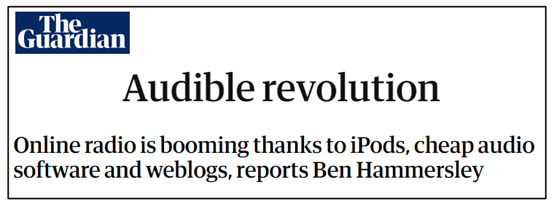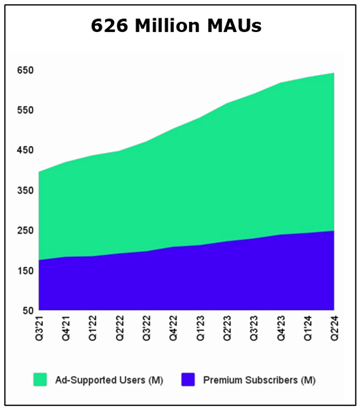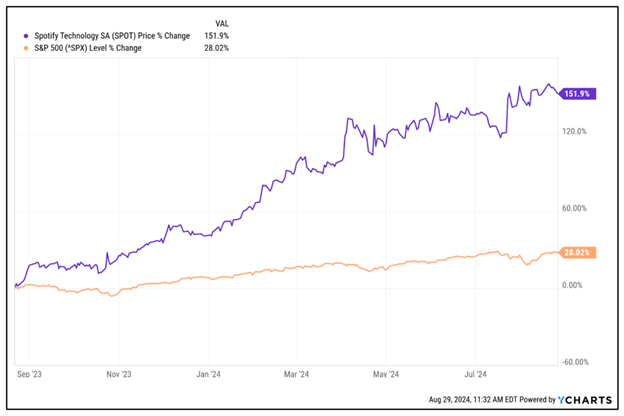 |
| By Michael A. Robinson |
A popular form of media consumption is nearing its 20th anniversary. Yet irony abounds …
That’s because this method of consumption is based on a communication style we’ve been enjoying for more than a century.
You see, radio has long been a way for us to listen to music, news, information, opinions and even sports — all while on the go.
But in 2004, a few broadcasters-turned-entrepreneurs devised a way for folks to make radio even more personal.
They envisioned a system where users could download programs from the internet and play them on personal devices like the iPod. That same year, the first podcast — a portmanteau of “iPod” and “broadcast” — debuted.
Today, podcasting is a huge trend and massive industry. According to Grand View Research, the podcast market will expand by more than 27% a year through 2030, reaching $130 billion.
But how exactly do you invest in a sector like this? Do you invest in individual podcast brands or personalities?
Nope, I’ve got a better idea … one that’s beating the broad market by more than 440% …
An Audible Revolution
Shortly after the broadcasters released the first podcast, journalist Ben Hammersley published a now-iconic article about the dawn of online radio.

Citing factors like the rise of the iPod, the increased affordability of home audio production software and the appetite for blogging that was already thriving, Hammersley noted that “all the ingredients are there for a new boom in amateur radio.” And from there, the audible revolution commenced.
Historians say it began to find traction in the fourth quarter of 2004. This revolution took a big step forward in June 2005, when Apple introduced podcasts into its iTunes music service and built a library of them in its music store.
Today, podcasts have more than 460 million listeners worldwide. The average listener spends seven hours per week listening to podcasts.
If it seems like a lot of time listening, it’s probably because there are a lot of podcasts — more than 5 million of them, in fact, boasting more than 70 million episodes between them.
As mentioned, the podcast market has exploded in value. And that’s created opportunities for a select few companies to become sought-after acquisition targets.
In 2021, Amazon acquired podcast network Wondery at a time when the company was valued at roughly $300 million. And earlier this year, Sony Music acquired podcast company Neon Hum Media.
Amazon and Sony Music are certainly two popular platforms for accessing podcasts. But they’re far from the leader in this field.
Spot-On Technology
Turns out, there is one company that simply crushes Amazon and Sony’s podcast efforts combined. That company is Spotify Technology (SPOT).
Founded in 2006 and based in Sweden, Spotify is one of the largest audio streaming services, with more than 626 million monthly active users and 246 million paying subscribers.

The company operates as a freemium service. A basic subscription doesn’t cost anything, but you’ll have to listen to ads along with the content. For a monthly fee, you can get rid of the ads and unlock additional programs and podcasts.
In 2023, Spotify did what seemingly every company is doing these days. It incorporated AI into its service.
More specifically, it debuted an “AI DJ,” which enhances the level of customization and personalization Spotify provides its users. You see, Spotify has always put a focus on the individual user. They can create playlists and “favorite” songs, albums or artists.
AI DJ chooses what music to play based on your listening habits. And it constantly searches for new music you might like. It’ll even resurface throwback tunes you once enjoyed.
At its core, Spotify is a streaming platform for music. Today it offers more than 100 million songs.
But make no mistake, it’s ventured heavily into podcasts lately. And that move has paid off big-time …
Podcasts Are a Hit
Today, Spotify has more than 6 million podcasts. And its recent acquisition spree signals an investment in this form of entertainment.
- In 2019, the company acquired Anchor, which enables podcasters to quickly and easily create a podcast.
- In 2020, Spotify acquired Megaphone, which helps podcasters make money by inserting ads into podcast episodes.
- And in 2021, it acquired Podz, which enables listeners to more easily find new podcasts.
Certain people flock to Spotify because of its extensive library of podcasts. But plenty of others have become attached to their favorite podcasters.
Joe Rogan, for example, hosts “The Joe Rogan Experience,” which has become the No. 1 podcast in the world. It has 3 billion listeners and more than 17 million subscribers.
Alex Cooper is another popular podcaster. Her comedy podcast, “Call Her Daddy,” is the most listened to podcast by women. And as of May 2024, it has nearly 4 million followers on Spotify.
And then there’s Tucker Carlson, who hosts “The Tucker Carlson Show.” His podcast is popular on Spotify, too. In fact, in the last week of July, Carlson briefly dethroned Rogan as the most listened to podcast on the platform.
A Company on the Rise
Clearly, Spotify is a go-to source for podcasts. Granted, it hasn’t been entirely smooth sailing for the streaming platform.
Last year, Spotify laid off 17% of its staff, the third round of job cuts in 2023 — in an effort to trim costs by about $1 billion and reach profitability in 2024.
That being said, this is still a company that’s on the rise.
Last quarter, earnings growth for Spotify came in at 185%. Even better, growth is expected to end the year up 312%.
If we cut that full-year forecast in half to be conservative, it would still be a stunning 17 times that of its closest podcast competitor — Apple.
No wonder Spotify’s stock is beating the broader market by more than 440%.

And as the love of podcasts continues, you can bet that Spotify will continue to reap the rewards.
Best wishes,
Michael A. Robinson
P.S. As you can see with the addition of AI DJ, companies continue to pour resources into AI capabilities.
Wednesday’s Nvidia earnings also proves that it needs help keeping up.
Fortunately, I’ve uncovered who the AI giants are turning to. Check it out here.

